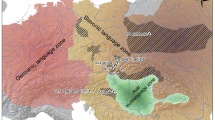Abstract
Two ways of considering science—as a cultural phenomenon and as a sociocultural project—are analyzed through the prism of the sociophilosophical program of science development that was proposed by A.A. Bogdanov, a thinker and public figure. The premises of Bogdanov’s approach to the analysis of the stage of science development in his lifetime are revealed, making it possible to highlight the character of the ideological and sociocultural situation at the turn of the 20th century. At that time, the positivistic mindset and the recognition of science as a decisive element of cultural and historical integrity, formed by the European intellectual tradition, including to a significant extent the Russian one, coincided with the rise of the ideology of social reconstruction. It is shown that Bogdanov developed an original interpretation of Marxism with the involvement of the ideas of so-called second positivism, which included problems of the development of science and technology in the context of the historical development of human society. On the one hand, this made it possible to go beyond the internalist consideration of science (the view from the inside) and, on the other, to pose the question about science as a phenomenon not simply forming spontaneously but also accessible for conscious organizing activity, i.e., for control. In Bogdanov’s project, this control included not only scientific policy but also a broader one, which can be defined as sociocultural projecting, putting the scientist’s ideas on a par with various programs of substantiating science as a cultural value and social institution, characteristic of the formation and development of the modern European scientific tradition.
Similar content being viewed by others
REFERENCES
F. Kh. Kessidi, Ideas and People: Historicophilosophical and Sociopolitical Essays (Inst. Filos. Russ. Akad. Nauk, Moscow, 2003) [in Russian].
Western Philosophy of the 20th–Early 21st Centuries: Intellectual Biographies (Tsentr Gumanitarnykh Initsiativ, St. Petersburg, 2016) [in Russian].
N. N. Moiseev, People and Cybernetics (Molodaya Gvardiya, Moscow, 1994) [in Russian].
V. A. Lektorskii, Philosophy, Cognition, Culture (Kanon+, Moscow, 2012) [in Russian].
Yu. E. Arkhangel’skii and I. I. Gorlova, “The essential characteristic of totalitarianism and totalitarian culture in the context of culturological knowledge,” Teor. Prak. Obshchestv. Razv., No. 4, 77–78 (2010).
S. V. Pirozhkova, “Soviet Marxism and identity of contemporary Russian philosophy,” Herald Russ. Acad. Sci. 88 (6), 539–548 (2018).
D. Steila, Scienza e revoluzione: La recezione dell’empiriocriticismo nella cultura russa (1877–1910) (Casa Editrice Le Lettere, Florence, 1996).
V. M. Mezhuev, Marx vs. Marxism: Articles on Unpopular Topics (Kul’turnaya Revolyutsiya, Moscow, 2007) [in Russian].
M. V. Loktionov, Alexander Bogdanov between Marxism and Positivism (Inst. Filos. Russ. Akad. Nauk, Moscow, 2018) [in Russian].
M. V. Loktionov, Alexander Bogdanov: An Unknown Marxism (GAUGN-Press, Moscow, 2018) [in Russian].
The Constructivist Approach to Epistemology and Human Sciences, Ed. by V. A. Lektorskii (Kanon+, Moscow, 2009) [in Russian].
Psychology and Postmodernism, Ed. by S. Kvale (Thousand Oaks, London, 1992).
K. Gergen, An Invitation to Social Construction (Thousand Oaks, London, 1999).
M. Borup, N. Brown, K. Konrad, and H. van Lente, “The sociology of expectations in science and technology,” Technol. Anal. Strategic Management 18 (3/4), 285–298 (2006).
B. C. van Fraassen, The Scientific Image (Oxford Univ. Press, Oxford 1980).
A. A. Bogdanov, Tektology (Universal Organizational Science), in 2 vols. (Ekonomika, Moscow, 1989), Vol. 1 [in Russian].
E. O. Trufanova, Subject and Cognition in the World of Social Constructions (Kanon+, Moscow, 2018) [in Russian].
G. D. Gloveli and N. K. Figurovskaya, “The tragedy of collectivism,” in A. A. Bogdanov, Problems of Socialism: Works of Different Years (Politizdat, Moscow, 1990), pp. 3–28 [in Russian].
T. Rockmore, “Is Marx a materialist?,” Epistemol. Philos. Sci. 55 (3), 62–75 (2018).
A. A. Bogdanov, Faith and science. http://psylib.org.ua/books/lenin01/txt14.htm. Cited November 10, 2018.
S. V. Pirozhkova and V. V. Omelaenko, “Historical context and contemporary significance of Alexander Bogdanov’s social projects,” Istoriya 10 (12) (2019). https://history.jes.su/S207987840005338-0-1/?sl=en. Cited February 18, 2020.
A. A. Bogdanov, Problems of Socialism: Works of Different Years (Politizdat, Moscow, 1990) [in Russian].
A. A. Bogdanov, “Socialism of science,” in A. A. Bogdanov, Problems of Socialism: Works of Different Years (Politizdat, Moscow, 1990), pp. 360–410 [in Russian].
S. V. Pirozhkova, “Humanistic support for technological development: What should it be like?” Herald Russ. Acad. Sci. 88 (3), 210–219 (2018).
O. E. Stolyarova, “The third wave of science studies as a philosophical justification for STS,” Logos 24, 31–52.
A. Jamison, S. H. Christensen, and L. Botin, Hybrid Imagination: Science and Technology in Cultural Perspective (Morgan & Claypool, 2011).
V. G. Gorokhov and A. Grunwald, “Each innovation has a social character (Social assessment of technology as an applied philosophy of technology),” Vyssh. Obr. Ross., No. 5, 135–145 (2011).
L. M. Kosareva, The Birth of Modern Science from the Spirit of Culture (Inst. Psikhol. Ross. Akad. Nauk, Moscow, 1997) [in Russian].
S. I. Vavilov, “The scientific genius of Stalin,” in The USSR Academy of Sciences to Iosif Vissarionovich Stalin (Izd. Akad. Nauk SSSR, Moscow, 1949) [in Russian].
V. A. Lektorskii, “Inevitability of ideology (Ideology, science, philosophy),” in Philosophy and Ideology: From Marx to Postmodernism, Ed. by A. A. Guseinov and A. V. Rubtsov (Progress-Traditsiya, Moscow, 2018) [in Russian], pp. 180–189.
E. L. Chertkova, “Utopia as a ‘philosophical project,’” Vopr. Filos., No. 5, 190–201 (2015).
Funding
This study was supported by the Russian Science Foundation, project no. 19-78-00134.
Author information
Authors and Affiliations
Corresponding author
Additional information
Translated by B. Alekseev
Sophia Vladislavovna Pirozhkova, Cand. Sci. (Philos.), is a Senior Research Fellow of the RAS Institute of Philosophy.
Rights and permissions
About this article
Cite this article
Pirozhkova, S.V. Science As a Cultural Phenomenon and a Sociocultural Project. Her. Russ. Acad. Sci. 90, 324–331 (2020). https://doi.org/10.1134/S1019331620030053
Received:
Revised:
Accepted:
Published:
Issue Date:
DOI: https://doi.org/10.1134/S1019331620030053




